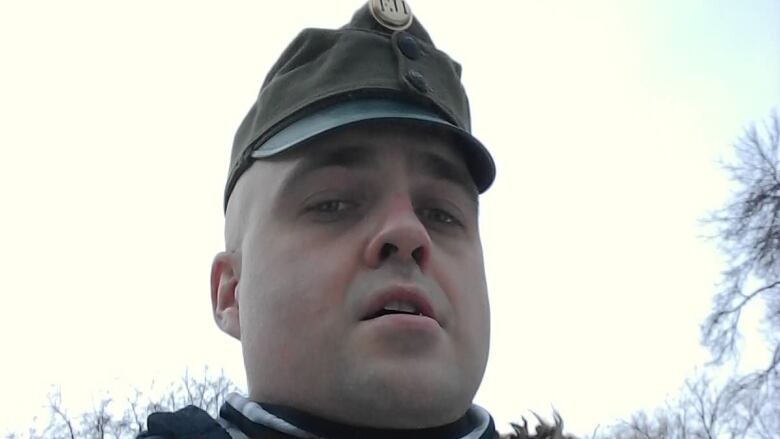Accused killer's allegedly hate-filled online presence should be factored into investigation, trial: experts
Jeremy Skibicki accused of first-degree murder in death of Rebecca Contois

WARNING: This story contains distressing details.
A Winnipeg man's possible motivations in his alleged killing of a First Nations woman should be investigated and considered during his trial, experts say.
Jeremy Skibicki, 35, is charged with first-degree murder in the death of Rebecca Contois, 24, who was a member of O-Chi-Chak-Ko-Sipi First Nation, also known as Crane River, located on the western shore of Lake Manitoba. Her partial remains were found at a Winnipeg apartment building.
CBC reviewed posts on a Facebook page linked to Skibicki, dated before his arrest, which was rife with violent sentiments, as well as antisemitic, misogynistic and white supremacist material.
Sandra DeLaronde wants to see hate factored in to all police investigations and sentencing where First Nations, Inuit and Métis women and girls are killed, including the homicide of Contois.
DeLaronde, who's the project lead of the MMIWG Implementation Project in Manitoba, says that's a recommendation in the national inquiry's final report, as well as the Aboriginal Justice Inquiry in 1999, neither of which have been acted on sufficiently.

"Successive governments said, no, we're not implementing the recommendations of the AJI. That essentially gave licence to individuals to continue to hurt, harm and kill Indigenous women and girls knowing that there wouldn't be repercussions for their actions," DeLaronde said.
The MMIWG national inquiry said there continues to be a race-based genocide of Indigenous people, which especially targets women, girls and members of the LGBTQ+ community.
"This is not something that happened; it's something that continues to happen. And unless we are making systemic change to laws and policies, then it will continue to happen," DeLaronde said.
Helmut-Harry Loewen, an anti-fascist researcher and former instructor of criminology and sociology at the University of Winnipeg, says the accused's online presence is cause for investigation.
"I strongly urge that this first-degree homicide also be looked at very closely, not just in terms of the social media posts, but how these posts may have formed this mindset," he said.
Loewen says these views must form a part of the investigation. A finding of hate as motivation can result in harsher punishment if a person is found guilty.
The allegations against Skibicki have not yet been proven in court.

In his Facebook bio, Skibicki declares himself an "official member of 'Holy Europe,'" which is a small faction of a broader far-right movement, Loewen said.
"Holy Europe is part of a broader picture that he was interested in — a range of movements and groups which are associated with or which are embedded within what I call a broader fascist ecosystem," Loewen said.
Holy Europe, also known as the Alliance of Patriotic Parallel Movements of European Folks, demands the re-Christianization of Europe and its colonies, its website said. The website promotes the belief that white Europeans need to preserve their bloodlines from being diluted, for example, through race-mixing, multiculturalism, immigration and other things.
When CBC News asked Manitoba Justice if hate would be investigated as a motivating factor in this homicide, a spokesperson said they can't comment as the case is before the court.
Skibicki's lawyer Leonard Tailleur told CBC News that Skibicki is presumed innocent until he's proven guilty.
"That's huge, of course, to our criminal justice system. Without that, we have nothing, so that's what I would ask people to keep in mind."
Tailleur has advised Skibicki not to speak publicly about his case or any of the allegations against him.
A trial date for Skibicki has not been set. His next court hearing is June 25.
Few crimes deemed hate-motivated
Evidence that a crime is motivated by bias, prejudice or hate can influence the accused's sentence, according to the Criminal Code of Canada.
However, both Loewen and the head of the Canadian Anti-Hate Network say people who commit crimes are rarely deemed to be motivated by hate.
Some police forces will issue charges without fully investigating the crime as motivated by hate, while other times Crown attorneys will say they don't have clear enough evidence to prove the motivation in front of a judge, said Evan Balgord, the executive director of the network.

"The net result of all of this is that very, very few cases actually result in a person getting a more punitive sentence because it was hate-motivated. It's an incredibly difficult thing to prove," Balgord said.
An investigation by the Globe And Mail from March of 2022 showed that in the majority of hate crime cases across Canada, charges are not being laid. Winnipeg's rates of charging for hate crimes are the worst among the country's 13 largest municipal and regional forces.
Balgord believes more cases should be investigated as motivated by hate, including crimes against women, which, he says, are often deemed domestic violence.
In Skibicki's case, court documents show that in 2019, his estranged wife — whom CBC is not naming — got a protection order against him on their first wedding anniversary.
Two years later, he was charged with threatening her, assaulting her with a weapon causing bodily harm and disobeying court orders, the documents say.
"Not often enough do we interrogate how much a person's ideology and their hatred for women play into the act," Balgord said.
"I hope that that is something that is seriously looked at and considered in the context of this case."
Support is available for anyone affected by MMIWG or by the latest reports.
An independent, national, toll-free support call line is available 24 hours a day to provide support for anyone who requires assistance: 1-844-413-6649. The service is available in English, French, Cree, Ojibway and Inuktitut.
Individuals can also access immediate mental health counselling and crisis intervention services at the Hope for Wellness helpline by calling 1-855-242-3310 or online at www.hopeforwellness.ca.

